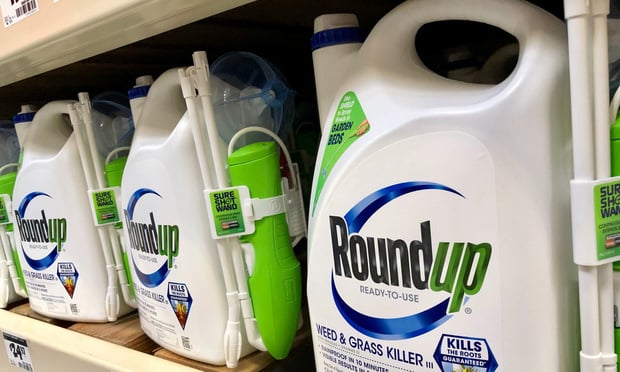Judge Who Reduced $2B Roundup Verdict Said Monsanto Manipulated the Science
A California judge reduced the award to $86.7 million but rejected Monsanto's argument against punitive damages based on an appeals court dismissal this month of a $417 million talc verdict against Johnson & Johnson.
July 26, 2019 at 05:16 PM
6 minute read

A California judge reduced a $2 billion Roundup verdict to a fraction of that amount on Thursday, but it's Monsanto who is gearing up for an appeal.
Why? Because the judge refused to toss out the verdict altogether and, although she reduced the award to $86.7 million, she also found there was “clear and convincing evidence” that Monsanto's actions were “reprehensible” and showed a “conscious disregard for health.” That finding, Alameda County Superior Court Judge Winifred Smith wrote, sufficiently warranted punitive damages, which she calculated at four times the compensatory damages.
In reaching such a conclusion, Smith rejected Monsanto's argument that the Roundup case was akin to the $417 million talcum powder verdict against Johnson & Johnson that a California Court of Appeal dismissed earlier this month. In that case, Johnson & Johnson acknowledged the scientific studies on whether its baby powder caused ovarian cancer and “drew a conclusion from that science,” Smith wrote.
“In contrast to actions of the defendant in J&J to question the science in public and to influence or persuade public agencies on regulatory decisions, in this case there is evidence that Monsanto made efforts to impede, discourage, or distort the underlying scientific inquiry,” she wrote.
Monsanto parent company Bayer AG, in a statement Thursday, called the reduced award a “step in the right direction” but immediately vowed to appeal, citing the July 9 decision by the Second District Court of Appeal.
That ruling, Bayer wrote, “which found that a dispute over the science does not meet the clear and convincing standard required for a punitive award, supports the company's position that there is no basis to award punitive damages in this case.”
Bayer's next move would be before the First District Court of Appeal. It would be the third appeal for Monsanto, which lost a $289 million verdict last year and an $80 million award this year over Roundup. California judges in those cases reduced the awards to $78 million and $25.3 million, respectively.
Plaintiffs lawyer Michael Baum, president of Los Angeles-based Baum Hedlund Aristei & Goldman, said his clients would be willing to accept Smith's reduced award. In a statement Thursday, his law firm vice president and co-lead trial counsel R. Brent Wisner called her ruling a “major victory.”
“The judge rejected every argument Monsanto raised and sustained a very substantial verdict,” he said.
In the case before Smith, both plaintiffs, Alberta and Alva Pilliod, claimed Roundup caused them to get non-Hodgkin lymphoma. On May 13, the jury awarded its verdict, which included $1 billion in punitive damages to each plaintiff.
In the talcum powder case, a Los Angeles County Superior Court judge in 2017 tossed the $417 million verdict, finding “ongoing debate in the scientific and medical community” over whether talc caused ovarian cancer. The appeals court, in its ruling this month, upheld most of that ruling.
In Roundup, the scientific evidence is “even less favorable” to the plaintiffs, Monsanto's lawyers wrote in a July 15 supplemental brief about the talc decision.
“In summary, the evidence in J&J showed a company 'defending' its product amidst an awareness of studies showing a possible association between the product and cancer, and an ongoing scientific debate as to whether the company's product is carcinogenic,” they wrote.
Smith, however, drew a distinction.
“The distinction she made was the difference between engaging in a public debate of the policy and the public debate of the science, compared to manipulating the science, and Monsanto engaged in manipulating the science,” Baum said. “She also found that the conduct was reprehensible conduct. It was despicable conduct. It showed a conscious disregard.”
That decision, along with similar findings in the two prior Roundup trials, provide a “solid foundation for all the cases going forward,” he said.
Smith's ratio between punitive damages and compensatory damages also was in line with U.S. District Judge Vince Chhabria of the Northern District of California's reduced award in the second trial, which was in the Northern District of California.
But she reduced noneconomic damages for both plaintiffs from $52 million to $17.1 million, plus Alva Pilliod's medical damage from $2.9 million to $50,000.
That might have been one reason why Smith awarded punitive damages at a higher ratio than 1:1, which is what San Francisco Superior Court Judge Suzanne Bolanos did in the first trial, Baum said. In that case, the jury awarded plaintiff Dewayne “Lee” Johnson $39.25 million in compensatory damages.
“Her rationale is she did not touch the compensatory damages, so the compensatory finding of $39.2 million for Lee Johnson she considered high, and we collected already some level of something along the lines of a recognition of reprehensible conduct,” Baum said of Bolanos. “But Judge Smith, on the other hand, reduced the punitive damages into a lower range so that she squeezed out what she thought was a recognition of reprehensible conduct.”
Her ruling might not withstand scrutiny under both California and U.S. Supreme Court law, primarily its 2003 holding in State Farm Mutual Automobile Insurance v. Campbell, which sought to limit punitive damages to less than 10 times the compensatory damages due to constitutional concerns.
“One of the things the court has said in a couple of cases is the amount of punitive damages in a particular case is supposed to be directed at the defendant's conduct toward the plaintiff, not everybody in the whole world,” said Jean Eggen, a professor at Widener University's Delaware Law School. “The Supreme Court would rather see the deterrence value in the punitive damages in the course of conduct in each individual case that's been impacted, each individual person who's been impacted, rather than in a single case actually being the only deterrent.”
Yet a verdict of $86.7 million, as in the earlier Roundup awards, puts little pressure on Monsanto to warn the public about the dangers of its product, Baum said.
“You need to have a more substantial punitive damages award, or they'll keep doing it as business as usual,” he said.
This content has been archived. It is available through our partners, LexisNexis® and Bloomberg Law.
To view this content, please continue to their sites.
Not a Lexis Subscriber?
Subscribe Now
Not a Bloomberg Law Subscriber?
Subscribe Now
NOT FOR REPRINT
© 2025 ALM Global, LLC, All Rights Reserved. Request academic re-use from www.copyright.com. All other uses, submit a request to [email protected]. For more information visit Asset & Logo Licensing.
You Might Like
View All
Devin Nunes, Former California GOP Congressman, Loses Move to Revive Defamation Suit
6 minute read
'Close Our Borders?' Senate Judiciary Committee Examines Economics, Legal Predicate for Mass Deportation Proposal
3 minute read
A Judge Asks: Is It Time to End Ken Feinberg's Roundup Settlement Program?
7 minute read
Trending Stories
- 1Uber Files RICO Suit Against Plaintiff-Side Firms Alleging Fraudulent Injury Claims
- 2The Law Firm Disrupted: Scrutinizing the Elephant More Than the Mouse
- 3Inherent Diminished Value Damages Unavailable to 3rd-Party Claimants, Court Says
- 4Pa. Defense Firm Sued by Client Over Ex-Eagles Player's $43.5M Med Mal Win
- 5Losses Mount at Morris Manning, but Departing Ex-Chair Stays Bullish About His Old Firm's Future
Who Got The Work
J. Brugh Lower of Gibbons has entered an appearance for industrial equipment supplier Devco Corporation in a pending trademark infringement lawsuit. The suit, accusing the defendant of selling knock-off Graco products, was filed Dec. 18 in New Jersey District Court by Rivkin Radler on behalf of Graco Inc. and Graco Minnesota. The case, assigned to U.S. District Judge Zahid N. Quraishi, is 3:24-cv-11294, Graco Inc. et al v. Devco Corporation.
Who Got The Work
Rebecca Maller-Stein and Kent A. Yalowitz of Arnold & Porter Kaye Scholer have entered their appearances for Hanaco Venture Capital and its executives, Lior Prosor and David Frankel, in a pending securities lawsuit. The action, filed on Dec. 24 in New York Southern District Court by Zell, Aron & Co. on behalf of Goldeneye Advisors, accuses the defendants of negligently and fraudulently managing the plaintiff's $1 million investment. The case, assigned to U.S. District Judge Vernon S. Broderick, is 1:24-cv-09918, Goldeneye Advisors, LLC v. Hanaco Venture Capital, Ltd. et al.
Who Got The Work
Attorneys from A&O Shearman has stepped in as defense counsel for Toronto-Dominion Bank and other defendants in a pending securities class action. The suit, filed Dec. 11 in New York Southern District Court by Bleichmar Fonti & Auld, accuses the defendants of concealing the bank's 'pervasive' deficiencies in regards to its compliance with the Bank Secrecy Act and the quality of its anti-money laundering controls. The case, assigned to U.S. District Judge Arun Subramanian, is 1:24-cv-09445, Gonzalez v. The Toronto-Dominion Bank et al.
Who Got The Work
Crown Castle International, a Pennsylvania company providing shared communications infrastructure, has turned to Luke D. Wolf of Gordon Rees Scully Mansukhani to fend off a pending breach-of-contract lawsuit. The court action, filed Nov. 25 in Michigan Eastern District Court by Hooper Hathaway PC on behalf of The Town Residences LLC, accuses Crown Castle of failing to transfer approximately $30,000 in utility payments from T-Mobile in breach of a roof-top lease and assignment agreement. The case, assigned to U.S. District Judge Susan K. Declercq, is 2:24-cv-13131, The Town Residences LLC v. T-Mobile US, Inc. et al.
Who Got The Work
Wilfred P. Coronato and Daniel M. Schwartz of McCarter & English have stepped in as defense counsel to Electrolux Home Products Inc. in a pending product liability lawsuit. The court action, filed Nov. 26 in New York Eastern District Court by Poulos Lopiccolo PC and Nagel Rice LLP on behalf of David Stern, alleges that the defendant's refrigerators’ drawers and shelving repeatedly break and fall apart within months after purchase. The case, assigned to U.S. District Judge Joan M. Azrack, is 2:24-cv-08204, Stern v. Electrolux Home Products, Inc.
Featured Firms
Law Offices of Gary Martin Hays & Associates, P.C.
(470) 294-1674
Law Offices of Mark E. Salomone
(857) 444-6468
Smith & Hassler
(713) 739-1250






